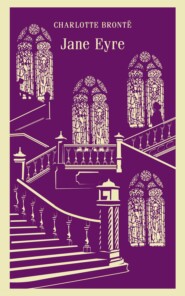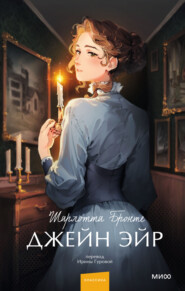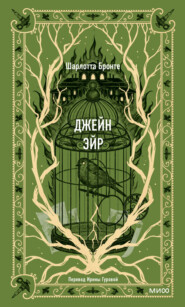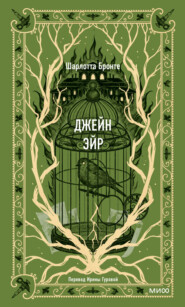По всем вопросам обращайтесь на: info@litportal.ru
(©) 2003-2024.
✖
Shirley
Настройки чтения
Размер шрифта
Высота строк
Поля
"Then you are going to seek him now? I'll accompany you."
"You will be spared that trouble, sir; he is coming to seek me. I'm just now sitting in state waiting his arrival."
"And who is it? One of my parishioners?"
Joe Scott had entered unobserved. He now stood, a most sinister phantom, half his person being dyed of the deepest tint of indigo, leaning on the desk. His master's answer to the rector's question was a smile. Joe took the word. Putting on a quiet but pawky look, he said, —
"It's a friend of yours, Mr. Helstone, a gentleman you often speak of."
"Indeed! His name, Joe? You look well this morning."
"Only the Rev. Moses Barraclough; t' tub orator you call him sometimes, I think."
"Ah!" said the rector, taking out his snuff-box, and administering to himself a very long pinch – "ah! couldn't have supposed it. Why, the pious man never was a workman of yours, Moore. He's a tailor by trade."
"And so much the worse grudge I owe him, for interfering and setting my discarded men against me."
"And Moses was actually present at the battle of Stilbro' Moor? He went there, wooden leg and all?"
"Ay, sir," said Joe; "he went there on horseback, that his leg mightn't be noticed. He was the captain, and wore a mask. The rest only had their faces blackened."
"And how was he found out?"
"I'll tell you, sir," said Joe. "T' maister's not so fond of talking. I've no objections. He courted Sarah, Mr. Moore's sarvant lass, and so it seems she would have nothing to say to him; she either didn't like his wooden leg or she'd some notion about his being a hypocrite. Happen (for women is queer hands; we may say that amang werseln when there's none of 'em nigh) she'd have encouraged him, in spite of his leg and his deceit, just to pass time like. I've known some on 'em do as mich, and some o' t' bonniest and mimmest-looking, too – ay, I've seen clean, trim young things, that looked as denty and pure as daisies, and wi' time a body fun' 'em out to be nowt but stinging, venomed nettles."
"Joe's a sensible fellow," interjected Helstone.
"Howsiver, Sarah had another string to her bow. Fred Murgatroyd, one of our lads, is for her; and as women judge men by their faces – and Fred has a middling face, while Moses is none so handsome, as we all knaw – the lass took on wi' Fred. A two-three months sin', Murgatroyd and Moses chanced to meet one Sunday night; they'd both come lurking about these premises wi' the notion of counselling Sarah to tak a bit of a walk wi' them. They fell out, had a tussle, and Fred was worsted, for he's young and small, and Barraclough, for all he has only one leg, is almost as strong as Sugden there – indeed, anybody that hears him roaring at a revival or a love-feast may be sure he's no weakling."
"Joe, you're insupportable," here broke in Mr. Moore. "You spin out your explanation as Moses spins out his sermons. The long and short of it is, Murgatroyd was jealous of Barraclough; and last night, as he and a friend took shelter in a barn from a shower, they heard and saw Moses conferring with some associates within. From their discourse it was plain he had been the leader, not only at Stilbro' Moor, but in the attack on Sykes's property. Moreover they planned a deputation to wait on me this morning, which the tailor is to head, and which, in the most religious and peaceful spirit, is to entreat me to put the accursed thing out of my tent. I rode over to Whinbury this morning, got a constable and a warrant, and I am now waiting to give my friend the reception he deserves. Here, meantime, comes Sykes. Mr. Helstone, you must spirit him up. He feels timid at the thoughts of prosecuting."
A gig was heard to roll into the yard. Mr. Sykes entered – a tall stout man of about fifty, comely of feature, but feeble of physiognomy. He looked anxious.
"Have they been? Are they gone? Have you got him? Is it over?" he asked.
"Not yet," returned Moore with phlegm. "We are waiting for them."
"They'll not come; it's near noon. Better give it up. It will excite bad feeling – make a stir – cause perhaps fatal consequences."
"You need not appear," said Moore. "I shall meet them in the yard when they come; you can stay here."
"But my name must be seen in the law proceedings. A wife and family, Mr. Moore – a wife and family make a man cautious."
Moore looked disgusted. "Give way, if you please," said he; "leave me to myself. I have no objection to act alone; only be assured you will not find safety in submission. Your partner Pearson gave way, and conceded, and forbore. Well, that did not prevent them from attempting to shoot him in his own house."
"My dear sir, take a little wine and water," recommended Mr. Helstone. The wine and water was hollands and water, as Mr. Sykes discovered when he had compounded and swallowed a brimming tumbler thereof. It transfigured him in two minutes, brought the colour back to his face, and made him at least word-valiant. He now announced that he hoped he was above being trampled on by the common people; he was determined to endure the insolence of the working-classes no longer; he had considered of it, and made up his mind to go all lengths; if money and spirit could put down these rioters, they should be put down; Mr. Moore might do as he liked, but he– Christie Sykes – would spend his last penny in law before he would be beaten; he'd settle them, or he'd see.
"Take another glass," urged Moore.
Mr. Sykes didn't mind if he did. This was a cold morning (Sugden had found it a warm one); it was necessary to be careful at this season of the year – it was proper to take something to keep the damp out; he had a little cough already (here he coughed in attestation of the fact); something of this sort (lifting the black bottle) was excellent, taken medicinally (he poured the physic into his tumbler); he didn't make a practice of drinking spirits in a morning, but occasionally it really was prudent to take precautions.
"Quite prudent, and take them by all means," urged the host.
Mr. Sykes now addressed Mr. Helstone, who stood on the hearth, his shovel-hat on his head, watching him significantly with his little, keen eyes.
"You, sir, as a clergyman," said he, "may feel it disagreeable to be present amidst scenes of hurry and flurry, and, I may say, peril. I dare say your nerves won't stand it. You're a man of peace, sir; but we manufacturers, living in the world, and always in turmoil, get quite belligerent. Really, there's an ardour excited by the thoughts of danger that makes my heart pant. When Mrs. Sykes is afraid of the house being attacked and broke open – as she is every night – I get quite excited. I couldn't describe to you, sir, my feelings. Really, if anybody was to come – thieves or anything – I believe I should enjoy it, such is my spirit."
The hardest of laughs, though brief and low, and by no means insulting, was the response of the rector. Moore would have pressed upon the heroic mill-owner a third tumbler, but the clergyman, who never transgressed, nor would suffer others in his presence to transgress, the bounds of decorum, checked him.
"Enough is as good as a feast, is it not, Mr. Sykes?" he said; and Mr. Sykes assented, and then sat and watched Joe Scott remove the bottle at a sign from Helstone, with a self-satisfied simper on his lips and a regretful glisten in his eye. Moore looked as if he should have liked to fool him to the top of his bent. What would a certain young kinswoman of his have said could she have seen her dear, good, great Robert – her Coriolanus – just now? Would she have acknowledged in that mischievous, sardonic visage the same face to which she had looked up with such love, which had bent over her with such gentleness last night? Was that the man who had spent so quiet an evening with his sister and his cousin – so suave to one, so tender to the other – reading Shakespeare and listening to Chénier?
Yes, it was the same man, only seen on a different side – a side Caroline had not yet fairly beheld, though perhaps she had enough sagacity faintly to suspect its existence. Well, Caroline had, doubtless, her defective side too. She was human. She must, then, have been very imperfect; and had she seen Moore on his very worst side, she would probably have said this to herself and excused him. Love can excuse anything except meanness; but meanness kills love, cripples even natural affection; without esteem true love cannot exist. Moore, with all his faults, might be esteemed; for he had no moral scrofula in his mind, no hopeless polluting taint – such, for instance, as that of falsehood; neither was he the slave of his appetites. The active life to which he had been born and bred had given him something else to do than to join the futile chase of the pleasure-hunter. He was a man undegraded, the disciple of reason, not the votary of sense. The same might be said of old Helstone. Neither of these two would look, think, or speak a lie; for neither of them had the wretched black bottle, which had just been put away, any charms. Both might boast a valid claim to the proud title of "lord of the creation," for no animal vice was lord of them; they looked and were superior beings to poor Sykes.
A sort of gathering and trampling sound was heard in the yard, and then a pause. Moore walked to the window; Helstone followed. Both stood on one side, the tall junior behind the under-sized senior, looking forth carefully, so that they might not be visible from without. Their sole comment on what they saw was a cynical smile flashed into each other's stern eyes.
A flourishing oratorical cough was now heard, followed by the interjection "Whisht!" designed, as it seemed, to still the hum of several voices. Moore opened his casement an inch or two to admit sound more freely.
"Joseph Scott," began a snuffling voice – Scott was standing sentinel at the counting-house door – "might we inquire if your master be within, and is to be spoken to?"
"He's within, ay," said Joe nonchalantly.
"Would you then, if you please" (emphasis on "you"), "have the goodness to tell him that twelve gentlemen wants to see him."
"He'd happen ax what for," suggested Joe. "I mught as weel tell him that at t' same time."
"For a purpose," was the answer. Joe entered.
"Please, sir, there's twelve gentlemen wants to see ye, 'for a purpose.'"
"Good, Joe; I'm their man. – Sugden, come when I whistle."
Moore went out, chuckling dryly. He advanced into the yard, one hand in his pocket, the other in his waistcoat, his cap brim over his eyes, shading in some measure their deep dancing ray of scorn. Twelve men waited in the yard, some in their shirt-sleeves, some in blue aprons. Two figured conspicuously in the van of the party. One, a little dapper strutting man with a turned-up nose; the other a broad-shouldered fellow, distinguished no less by his demure face and cat like, trustless eyes than by a wooden leg and stout crutch. There was a kind of leer about his lips; he seemed laughing in his sleeve at some person or thing; his whole air was anything but that of a true man.
"Good-morning, Mr. Barraclough," said Moore debonairly, for him.
"Peace be unto you!" was the answer, Mr. Barraclough entirely closing his naturally half-shut eyes as he delivered it.
"I'm obliged to you. Peace is an excellent thing; there's nothing I more wish for myself. But that is not all you have to say to me, I suppose? I imagine peace is not your purpose?"
"As to our purpose," began Barraclough, "it's one that may sound strange and perhaps foolish to ears like yours, for the childer of this world is wiser in their generation than the childer of light."
"To the point, if you please, and let me hear what it is."
"Ye'se hear, sir. If I cannot get it off, there's eleven behint can help me. It is a grand purpose, and" (changing his voice from a half-sneer to a whine) "it's the Looard's own purpose, and that's better."
"Do you want a subscription to a new Ranter's chapel, Mr. Barraclough? Unless your errand be something of that sort, I cannot see what you have to do with it."
"I hadn't that duty on my mind, sir; but as Providence has led ye to mention the subject, I'll make it i' my way to tak ony trifle ye may have to spare; the smallest contribution will be acceptable."
"You will be spared that trouble, sir; he is coming to seek me. I'm just now sitting in state waiting his arrival."
"And who is it? One of my parishioners?"
Joe Scott had entered unobserved. He now stood, a most sinister phantom, half his person being dyed of the deepest tint of indigo, leaning on the desk. His master's answer to the rector's question was a smile. Joe took the word. Putting on a quiet but pawky look, he said, —
"It's a friend of yours, Mr. Helstone, a gentleman you often speak of."
"Indeed! His name, Joe? You look well this morning."
"Only the Rev. Moses Barraclough; t' tub orator you call him sometimes, I think."
"Ah!" said the rector, taking out his snuff-box, and administering to himself a very long pinch – "ah! couldn't have supposed it. Why, the pious man never was a workman of yours, Moore. He's a tailor by trade."
"And so much the worse grudge I owe him, for interfering and setting my discarded men against me."
"And Moses was actually present at the battle of Stilbro' Moor? He went there, wooden leg and all?"
"Ay, sir," said Joe; "he went there on horseback, that his leg mightn't be noticed. He was the captain, and wore a mask. The rest only had their faces blackened."
"And how was he found out?"
"I'll tell you, sir," said Joe. "T' maister's not so fond of talking. I've no objections. He courted Sarah, Mr. Moore's sarvant lass, and so it seems she would have nothing to say to him; she either didn't like his wooden leg or she'd some notion about his being a hypocrite. Happen (for women is queer hands; we may say that amang werseln when there's none of 'em nigh) she'd have encouraged him, in spite of his leg and his deceit, just to pass time like. I've known some on 'em do as mich, and some o' t' bonniest and mimmest-looking, too – ay, I've seen clean, trim young things, that looked as denty and pure as daisies, and wi' time a body fun' 'em out to be nowt but stinging, venomed nettles."
"Joe's a sensible fellow," interjected Helstone.
"Howsiver, Sarah had another string to her bow. Fred Murgatroyd, one of our lads, is for her; and as women judge men by their faces – and Fred has a middling face, while Moses is none so handsome, as we all knaw – the lass took on wi' Fred. A two-three months sin', Murgatroyd and Moses chanced to meet one Sunday night; they'd both come lurking about these premises wi' the notion of counselling Sarah to tak a bit of a walk wi' them. They fell out, had a tussle, and Fred was worsted, for he's young and small, and Barraclough, for all he has only one leg, is almost as strong as Sugden there – indeed, anybody that hears him roaring at a revival or a love-feast may be sure he's no weakling."
"Joe, you're insupportable," here broke in Mr. Moore. "You spin out your explanation as Moses spins out his sermons. The long and short of it is, Murgatroyd was jealous of Barraclough; and last night, as he and a friend took shelter in a barn from a shower, they heard and saw Moses conferring with some associates within. From their discourse it was plain he had been the leader, not only at Stilbro' Moor, but in the attack on Sykes's property. Moreover they planned a deputation to wait on me this morning, which the tailor is to head, and which, in the most religious and peaceful spirit, is to entreat me to put the accursed thing out of my tent. I rode over to Whinbury this morning, got a constable and a warrant, and I am now waiting to give my friend the reception he deserves. Here, meantime, comes Sykes. Mr. Helstone, you must spirit him up. He feels timid at the thoughts of prosecuting."
A gig was heard to roll into the yard. Mr. Sykes entered – a tall stout man of about fifty, comely of feature, but feeble of physiognomy. He looked anxious.
"Have they been? Are they gone? Have you got him? Is it over?" he asked.
"Not yet," returned Moore with phlegm. "We are waiting for them."
"They'll not come; it's near noon. Better give it up. It will excite bad feeling – make a stir – cause perhaps fatal consequences."
"You need not appear," said Moore. "I shall meet them in the yard when they come; you can stay here."
"But my name must be seen in the law proceedings. A wife and family, Mr. Moore – a wife and family make a man cautious."
Moore looked disgusted. "Give way, if you please," said he; "leave me to myself. I have no objection to act alone; only be assured you will not find safety in submission. Your partner Pearson gave way, and conceded, and forbore. Well, that did not prevent them from attempting to shoot him in his own house."
"My dear sir, take a little wine and water," recommended Mr. Helstone. The wine and water was hollands and water, as Mr. Sykes discovered when he had compounded and swallowed a brimming tumbler thereof. It transfigured him in two minutes, brought the colour back to his face, and made him at least word-valiant. He now announced that he hoped he was above being trampled on by the common people; he was determined to endure the insolence of the working-classes no longer; he had considered of it, and made up his mind to go all lengths; if money and spirit could put down these rioters, they should be put down; Mr. Moore might do as he liked, but he– Christie Sykes – would spend his last penny in law before he would be beaten; he'd settle them, or he'd see.
"Take another glass," urged Moore.
Mr. Sykes didn't mind if he did. This was a cold morning (Sugden had found it a warm one); it was necessary to be careful at this season of the year – it was proper to take something to keep the damp out; he had a little cough already (here he coughed in attestation of the fact); something of this sort (lifting the black bottle) was excellent, taken medicinally (he poured the physic into his tumbler); he didn't make a practice of drinking spirits in a morning, but occasionally it really was prudent to take precautions.
"Quite prudent, and take them by all means," urged the host.
Mr. Sykes now addressed Mr. Helstone, who stood on the hearth, his shovel-hat on his head, watching him significantly with his little, keen eyes.
"You, sir, as a clergyman," said he, "may feel it disagreeable to be present amidst scenes of hurry and flurry, and, I may say, peril. I dare say your nerves won't stand it. You're a man of peace, sir; but we manufacturers, living in the world, and always in turmoil, get quite belligerent. Really, there's an ardour excited by the thoughts of danger that makes my heart pant. When Mrs. Sykes is afraid of the house being attacked and broke open – as she is every night – I get quite excited. I couldn't describe to you, sir, my feelings. Really, if anybody was to come – thieves or anything – I believe I should enjoy it, such is my spirit."
The hardest of laughs, though brief and low, and by no means insulting, was the response of the rector. Moore would have pressed upon the heroic mill-owner a third tumbler, but the clergyman, who never transgressed, nor would suffer others in his presence to transgress, the bounds of decorum, checked him.
"Enough is as good as a feast, is it not, Mr. Sykes?" he said; and Mr. Sykes assented, and then sat and watched Joe Scott remove the bottle at a sign from Helstone, with a self-satisfied simper on his lips and a regretful glisten in his eye. Moore looked as if he should have liked to fool him to the top of his bent. What would a certain young kinswoman of his have said could she have seen her dear, good, great Robert – her Coriolanus – just now? Would she have acknowledged in that mischievous, sardonic visage the same face to which she had looked up with such love, which had bent over her with such gentleness last night? Was that the man who had spent so quiet an evening with his sister and his cousin – so suave to one, so tender to the other – reading Shakespeare and listening to Chénier?
Yes, it was the same man, only seen on a different side – a side Caroline had not yet fairly beheld, though perhaps she had enough sagacity faintly to suspect its existence. Well, Caroline had, doubtless, her defective side too. She was human. She must, then, have been very imperfect; and had she seen Moore on his very worst side, she would probably have said this to herself and excused him. Love can excuse anything except meanness; but meanness kills love, cripples even natural affection; without esteem true love cannot exist. Moore, with all his faults, might be esteemed; for he had no moral scrofula in his mind, no hopeless polluting taint – such, for instance, as that of falsehood; neither was he the slave of his appetites. The active life to which he had been born and bred had given him something else to do than to join the futile chase of the pleasure-hunter. He was a man undegraded, the disciple of reason, not the votary of sense. The same might be said of old Helstone. Neither of these two would look, think, or speak a lie; for neither of them had the wretched black bottle, which had just been put away, any charms. Both might boast a valid claim to the proud title of "lord of the creation," for no animal vice was lord of them; they looked and were superior beings to poor Sykes.
A sort of gathering and trampling sound was heard in the yard, and then a pause. Moore walked to the window; Helstone followed. Both stood on one side, the tall junior behind the under-sized senior, looking forth carefully, so that they might not be visible from without. Their sole comment on what they saw was a cynical smile flashed into each other's stern eyes.
A flourishing oratorical cough was now heard, followed by the interjection "Whisht!" designed, as it seemed, to still the hum of several voices. Moore opened his casement an inch or two to admit sound more freely.
"Joseph Scott," began a snuffling voice – Scott was standing sentinel at the counting-house door – "might we inquire if your master be within, and is to be spoken to?"
"He's within, ay," said Joe nonchalantly.
"Would you then, if you please" (emphasis on "you"), "have the goodness to tell him that twelve gentlemen wants to see him."
"He'd happen ax what for," suggested Joe. "I mught as weel tell him that at t' same time."
"For a purpose," was the answer. Joe entered.
"Please, sir, there's twelve gentlemen wants to see ye, 'for a purpose.'"
"Good, Joe; I'm their man. – Sugden, come when I whistle."
Moore went out, chuckling dryly. He advanced into the yard, one hand in his pocket, the other in his waistcoat, his cap brim over his eyes, shading in some measure their deep dancing ray of scorn. Twelve men waited in the yard, some in their shirt-sleeves, some in blue aprons. Two figured conspicuously in the van of the party. One, a little dapper strutting man with a turned-up nose; the other a broad-shouldered fellow, distinguished no less by his demure face and cat like, trustless eyes than by a wooden leg and stout crutch. There was a kind of leer about his lips; he seemed laughing in his sleeve at some person or thing; his whole air was anything but that of a true man.
"Good-morning, Mr. Barraclough," said Moore debonairly, for him.
"Peace be unto you!" was the answer, Mr. Barraclough entirely closing his naturally half-shut eyes as he delivered it.
"I'm obliged to you. Peace is an excellent thing; there's nothing I more wish for myself. But that is not all you have to say to me, I suppose? I imagine peace is not your purpose?"
"As to our purpose," began Barraclough, "it's one that may sound strange and perhaps foolish to ears like yours, for the childer of this world is wiser in their generation than the childer of light."
"To the point, if you please, and let me hear what it is."
"Ye'se hear, sir. If I cannot get it off, there's eleven behint can help me. It is a grand purpose, and" (changing his voice from a half-sneer to a whine) "it's the Looard's own purpose, and that's better."
"Do you want a subscription to a new Ranter's chapel, Mr. Barraclough? Unless your errand be something of that sort, I cannot see what you have to do with it."
"I hadn't that duty on my mind, sir; but as Providence has led ye to mention the subject, I'll make it i' my way to tak ony trifle ye may have to spare; the smallest contribution will be acceptable."





